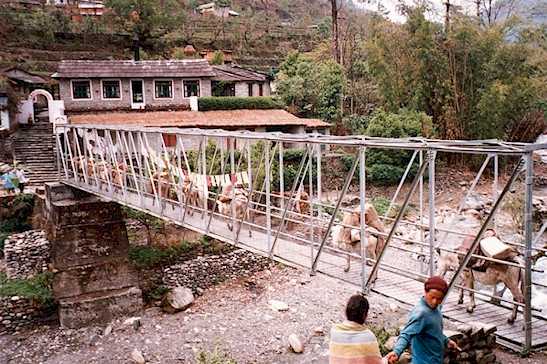
Being country director of the Peace Corps in Nepal, managing 225 Volunteers, must have been an administrative challenge
Q: Your website concentrates on your work with Morgan-Newman Associates/BMA, mostly in Saudi Arabia. I'm interested too in your various jobs before 1976. For example, being country director of the Peace Corps in Nepal, managing 225 Volunteers, must have been an administrative challenge. What did you learn from that experience?
A: I joined the Peace Corps in 1967 when the war in Viet Nam was becoming controversial. One result was that male Volunteers at that time were motivated at least partly by the chance to dodge the draft.
Knowing my background, Volunteers wanted to hear that I had grown tired of law, but that wasn’t entirely true. I had enjoyed practicing law but was about to be made a partner, which implies a commitment to stay with the firm. However, I had never intended to practice law all my life, and so I considered moving on. As an undergraduate, I had seen law school as a springboard to management. My basic degree was in Business Administration and, as there was no MBA degree in those days, law was a logical avenue for me and many others.
I ended up being sent as the deputy director in Nepal and, after six months, I became the country director. An early incident was my learning the hard way that I was in culture shock and didn’t know it. Peace Corps staff, like most of my overseas jobs, was a very bicultural experience – intensely American in many ways, very Nepali in others. I simply was not as immersed as the Volunteers were, or even as immersed as my own family was. It became apparent one day when I was visiting a village in eastern Nepal and saw a little girl, about 10, with two badly clubbed feet hobbling along behind her playmates on crude crutches.
Because clubbed feet are unheard of in developed countries (it is, of course, a very treatable disability), I suddenly – and embarrassingly, as I was in public – burst into tears, only later realizing that I had been under the mounting strain of culture shock. Seeing her just broke the dam. Not a pleasant experience, but a humbling and necessary one.
Marijuana was legal in Nepal, and is some of the best in the world. However, Peace Corps headquarters was terrified of the PR repercussions and Congressional reaction if the press got hold of cases of Volunteer use. (You can imagine the fallout at that time of a headline like “Pot Party in Kathmandu.”) So all country directors were ordered to absolutely forbid its use.
This was a dumb injunction in a country with 225 Volunteers, mostly single-posted in small villages. One of the things I learned early on was that the title Director is ridiculous; one cannot “direct” Volunteers whom one has to walk several days even to see. So I leveled with them, acknowledging the obvious, but warning that if the staff found out about someone’s marijuana use, they would be summarily fired on the assumption that if we learned of it, so could the press – and that risk was unacceptable. Fortunately, they understood and we seldom had to make good on the threat. An early version of “don’t ask/don’t tell,” I guess. Dealing with bureaucratic anomalies like that taught me a lot about personnel management.
One of the larger lessons about functioning as an American in an ancient culture I learned from my Ambassador, Carol Laise. At that time, Peace Corps headquarters was talking about “bi-nationalism;” that is, having overseas staffs composed of both Americans and host-country nationals. I took the idea seriously and started recruiting two senior Nepalese as Regional Directors.
When I next visited Washington, the Director, Jack Vaughn, applauded the move, but his lieutenants in the functional divisions told me it was impossible: We could not pay American salaries (for fear of disrupting “local wage rate” economics), nor could we grant them the housing, medical, and other perks enjoyed by the young, largely former-Volunteer American staff – and we certainly could not give them security clearances. I solved most of that last problem by destroying all of our accumulated, and over-classified, “Secret” files held at the Embassy. The Ambassador guided me on the harder personnel issues, as she had become an expert on Local Wage Rate employees from her job at a prior post. The Nepalese Regional Directors were hired, and were great.
